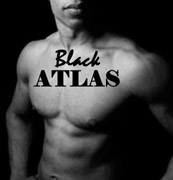
| HOME |
| NERVE |
| REVIEWS |
| ARCHIVE |
| EVENTS |
| LINKS |
| ABOUT US |
| CONTRIBUTORS |
| BACK ISSUES |
| CONTACT US |
 Black
Atlas
Black
Atlas
Unity Theatre, Hope
Place
(24th March 2007)
Reviewed by Hana Leaper
Devised and performed by the London Shakespeare Workout (LWS) and based upon George McDonald Fraser’s novel Black Ajax, Black Atlas commemorates the bicentennial of the signing of the Slave Trade Act.
The flier details say it tells the tale of two slaves – one literate and British, another from Africa. This is slightly misleading – what it actually tells is the tale of an American slave who wins his freedom in a boxing match and travels to regency England, where he is trained and egged on to fight by another black man. Due to his difference of bearing, Black Atlas is unable to recognise this man as a fellow freed slave, as a fellow black man. The revelation he is a former slave who has been brought up with a trade and educated by a British pro-Abolitionist reveals the violence done to the black man’s self-image, the result of the recurrent prejudice displayed by every type and class of white man in the play – excepting his nemesis, the champion miller Tom Cribb.
The logistics of the performance are quite startling: an all male cast of 8 members (3 black, 5 white, if you must know), including the Director/Narrator; no props, excepting a bell and two candlestick holders which are used once; chairs for seven audience members block off the stage left and right – seats for six actors along the back make up the boxing ring set; costumes consisting of white t-shirts, black jeans and one regency style coat which Black Atlas aka Tom Molyneaux briefly dons.
The phenomenal original score is improvised and performed afresh each recital by Tim Williams and his musical contraptions, visible from the side of the stage. The geographically disparate narrative structure is melded together by song. Accent locates the scene. Music conveys the mood. It’s all very simple. And powerful. And intense. Horrifying. Mesmeric. The lesson of the ending seems to be that Black Atlas’ ambitions and efforts, as well as those of the play, are just not enough. But in their own turn and time they have both lit candles and illuminated the world a little better.